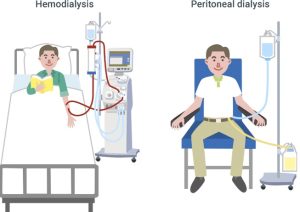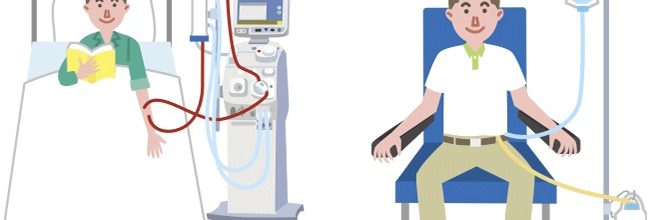Haemodialysis and Peritoneal dialysis
Haemodialysis and Peritoneal dialysis are both used to treat Kidney failure. Hemodialysis uses a man-made membrane (dialyzer) to filter wastes and remove extra fluid from the blood. Peritoneal dialysis uses the lining of the abdominal cavity (peritoneal membrane) and a solution (dialysate) to remove wastes and extra fluid from the body.

Haemodialysis versus Peritoneal dialysis
| Haemodialysis | Peritoneal dialysis |
| More effective in catabolic patients | Less effective |
| More effective in treatment of drug toxicity | Less effective |
| Urea clearance above 150 ml / min | 20-25 ml / min |
| Removes smaller uremic toxins with low molecular weight | Removes uremic toxins large molecular weight |
| Requires heparin anti-coagulation | Doses not require |
| May cause haemodynamic stress | Less frequent |
| Can not be performed in patient with compromised cardiac function not preferred in patients with profound uremia | Can be performed |
| Preferred due o slower luid and osmotic shift | |
| Disequilibrium syndrome common. | Uncommon |
| Not preferred in recent cerebral, surgery, vascular accidents, trauma, recent cardiac surgery, myocardial infarction, acute haemorrhage, coagulopathy. | Preferred |
| Preferred in recent abdominal surgery, complicating severe lung disease. | Not preferred |
Diet and fluid restrictions
With Peritoneal Dialysis, there are generally fewer diet and fluid restrictions as compared to hemodialysis.
Travel
It is generally easier to travel with Peritoneal Dialysis since you can carry your supplies with you. With hemodialysis, travel is possible but you can travel for short periods and come back in time for your next session or you can travel to a place where there is a hospital or center that offers dialysis.
Treatment process
Peritoneal Dialysis is considered to be less risky as a process because there is no blood going out of your system as in hemodialysis. Also, Peritoneal Dialysis offers continuous dialysis whereas hemodialysis is intermittent. If you have some residual renal function (if you still pass some urine), Peritoneal Dialysis is more effective as a form of dialysis and also at preserving this renal function. However, if you have no residual renal function (if you pass little or no urine), hemodialysis is more effective.
Cost
Peritoneal Dialysis is generally as expensive or cheaper than hemodialysis.
Body Art
In Peritoneal Dialysis, you will need to have a catheter (tube) inside your stomach the outer part of which will be outside your body. The tube is usually wrapped in a small pouch that is fastened around your stomach. With hemodialysis, you will need to get a fistula which may look like a swelling on your arm or wherever the fistula is made. In case of a jugular catheter you will have a couple of small tubes usually near your neck.
Infection
The chances of catching infections is higher on Peritoneal Dialysis than on hemodialysis. If proper washing techniques and sterile procedures are not followed, it is possible that you may catch bacterial infections which may lead to having to remove the Peritoneal Dialysis catheter. In hemodialysis, it is possible that you may catch viral infections if the proper washing procedures are not followed especially during reprocessing of the dialyser and bloodlines.
medlight2u.com
Acne Acne vulgaris Acute Renal Failure Adrenal cortex Angina Angina Pectoris Aortic Regurgitation (AR) Aortic Stenosis (AS) Chest pain Chronic pyelonephritis Coarctation of Aorta Cough cyanosis Cystic acne Dehydration depression Diabetes Mellitus Diagnosis of Aortic Stenosis Dr.KTS DR K TAMILSELVAN Fatigue Heart Failure Hypertension Hypokalemia Hypothyroidism Ischemic Heart Disease LBBB Mitral Incompetence Mitral insufficiency Mitral valve prolapse Nocturia Patent Ductus Arteriosus PDA Polyuria Proteinuria pulmonary hypertension Pulmonary Stenosis ST Depression Symptoms of Acne Syncope Treatment for acne valvular heart disease Ventricular Septal Defect VSD Zits


Leave a Reply